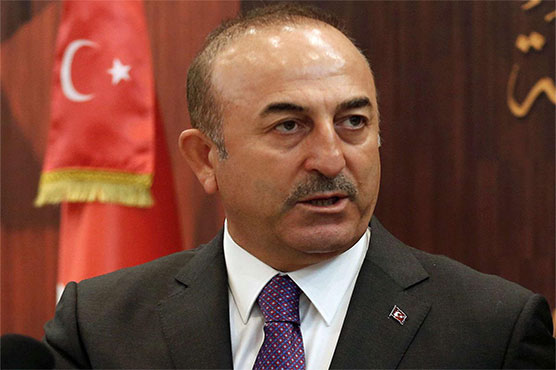Turkey warns France against supporting Kurd militia

Turkey on Tuesday warned France against protecting a US-backed Kurdish militia in Syria.
ANKARA (AFP) - Turkey on Tuesday warned France against protecting a US-backed Kurdish militia in Syria and said Ankara s military power was enough to defeat the Islamic State after US troops withdraw.
Washington s decision to pull out all 2,000 ground forces from Syria has stunned most allies, including France, but was greeted with approval by Turkey.
Ankara believes its forces supporting Syrian opposition fighters will now have a freer rein to target Kurdish fighters from the US-backed People s Protection Units (YPG).
"If France is staying to contribute to Syria s future, great, but if they are doing this to protect the (militia), this will bring no benefit to anyone," Foreign Minister Mevlut Cavusoglu said, according to Hurriyet daily.
Turkey views the YPG militia as a sister "terrorist" organisation of the outlawed Kurdistan Workers Party (PKK), which has waged an insurgency inside Turkey since 1984.
The PKK is blacklisted as a terror group by Ankara, the US and the European Union.
President Donald Trump last week ordered the withdrawal of US ground forces deployed in Syria to provide training to the YPG under the Kurdish-led Syrian Democratic Forces (SDF) alliance battling the Islamic State.
Cavusoglu told Turkish media during a briefing that Ankara has "the power to neutralise (IS) alone" amid fears that a US pull-out will hurt the fight against Islamic State.
The US presence has also been seen by analysts as key to pushing against Iranian and Russian influence.
Turkish President Recep Tayyip Erdogan on Tuesday said a Turkish delegation would head to Moscow "today, tomorrow" to discuss the US pull-out, TRT state broadcaster reported.
Erdogan added he expected to meet Russian President Vladimir Putin for face-to-face talks about the issue.
He had already invited Trump to visit Turkey in 2019, the White House said on Monday, as ties improve between the NATO allies amid past strains over US support to the YPG.
Trump s shock move put allies on the backfoot, with French President Emmanuel Macron on Sunday saying "an ally must be reliable".
In a sign of the growing diplomatic rift between the two leaders, Macron also said "I deeply regret the decision" by Trump to pull out troops.
France is a member of the international coalition against IS led by the US against jihadists in Syria and Iraq.
The French military has stationed fighter jets in Jordan and artillery along the Syrian border in Iraq as part of the coalition, as well as an undisclosed number of special forces on the ground.
French ministers said in the aftermath of Trump s announcement that the fight against IS continued as the group had not been fully eliminated from the region.
Cavusoglu hit out at French "support" of the YPG, which he said was "no secret" as he slammed French officials meetings with leaders of the SDF s political wing last week.
The co-chairs of the Syrian Democratic Council were in Paris on Friday and warned that a Turkish attack could bring the battle against the IS in Syria to a halt.
They also called for French support in assuring the region s peace and stability.
Kurdish-led forces on Monday with aerial support from the coalition closed in on the two main spots where jihadists defended their eastern Syria stronghold.
Critics say thousands of IS members are still in Syria and could pose a threat with some analysts concerned the withdrawal could lead to a resurgence of IS.
But Erdogan has previously said Ankara will intervene in the coming months against IS and the YPG, telling Trump on Sunday that Turkey would "eradicate" the last elements.
Cavusoglu said the US withdrawal "should not serve the YPG s separatist agenda".
Turkey over the weekend sent military reinforcements to the the border with Syria, with parts of the convoy entering Syria in areas held by Turkish-backed Syrian rebels.
Turkey has previously launched two operations with the rebels in Syria against IS in August 2016 and against the YPG in its northwestern enclave of Afrin in January 2018.

